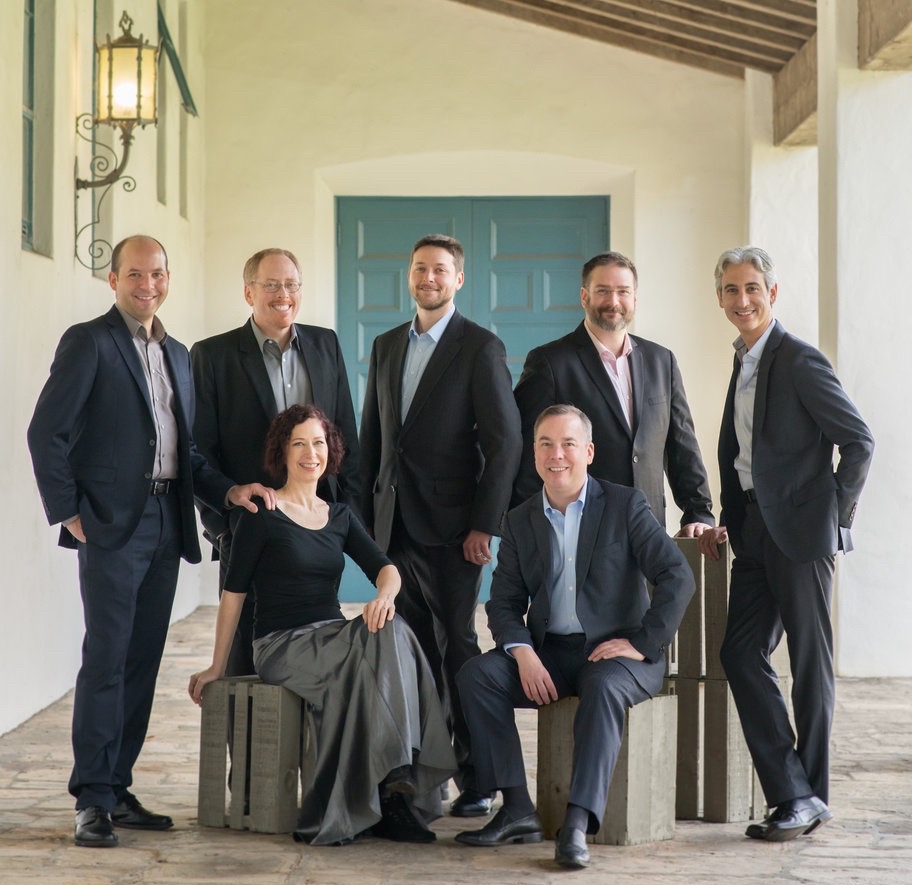Quicksilver’s “Cabinet of Curiosities” explores neglected Baroque masters

Quicksilver performed Sunday at Corpus Christi Church in the Music Before 1800 series. Photo: Teresa Tam Studio
The composer Dittersdorf once complained that his young friend Mozart was so blessed with good ideas, he used too many of them in each piece. One wonders what Dittersdorf would have made of the composers represented on Sunday by the Baroque ensemble Quicksilver. While utterly charming in the group’s suave performances, these sonatas from the middle 17th Century exhibited the attention span of a teenager on Snapchat.
In this obscure period between the high Renaissance of Palestrina and Monteverdi and the high Baroque of Bach and Vivaldi, the composers’ preference — or perhaps their noble employers’ limited powers of concentration — apparently dictated a constant flow of fresh ideas through every one-movement piece. Tempos, meters, harmonies all turned on a dime, and often. If you didn’t like what you were hearing, wait fifteen seconds and something entirely different would pop up.
But there were few if any unlikable moments in this self-styled “Cabinet of Musical Curiosities” presented by Music Before 1800 at Corpus Christi Church in Morningside Heights. Listeners accustomed to clear divisions between fast and slow movements might have had to adjust their expectations; at times the changes were so bar-by-bar that one couldn’t even tell at what tempo the music was traveling. But in the end the delicious playing of the six Quicksilver musicians swept one irresistibly along.
The period-instrument players — Robert Mealy and Julie Andrijeski, violins (and co-directors of the group); Greg Ingles, trombone; Dominic Teresi, dulcian (an ancestor of the bassoon); Avi Stein, harpsichord and organ; and Charles Weaver, Baroque guitar and theorbo (a type of lute) — beguiled the ear with tone ranging from the slenderest thread to a sonorous tutti, and with spot-on intonation that made the wondrous-strange harmonies glow.
More importantly, the musicians seemed to sense the thread of inspiration that ran through all the disparate musical ideas — a necessary skill in playing Mozart, too — and gave a coherent, richly expressive account of each sonata as it (typically) stretched its wings in a slow opening section, alternately danced and emoted through quicksilver episodes, and settled gently back to earth in a closing diminuendo.
If this was not the sequence of movements leading to a peppy finish that we know from Bach and after, Sunday’s players imbued this particular approach with a poetry all its own, locating a distinctive aesthetic in that verdant valley between music history peaks.
Of the even dozen composers selected, only Heinrich von Biber might win a name-recognition contest in 2017. His entry was a sonorous “Sonata a 3” with dazzling solo recitatives for each violin and the dulcian. But the other eleven were all celebrated violin virtuosos or music directors in their day, and the ensemble made a persuasive case for each, both in performance and in concise program notes.
Certainly Matthias Weckmann won’t remain an unknown to this listener, after hearing his Sonata No. 9 “a 4” — that is, with four solo voices plus continuo — which opened the program with alternating tempos and proto-Romantic harmonies that made one think of a dumka by Dvořák. Later, Weckmann’s Sonata No. 7 launched the concert’s second half with cogent ideas that received some actual development from section to section.
Both halves of the program closed with sonatas by Dario Castello, a standout for his rich sonorities and catchy tunes. Exceptionally, his Sonata decimaterza (i.e., No. 13) started and ended fast, firing off one teasing rhythmic joke after another, while the program-ending Sonata decimaquarta (14) generated considerable excitement in its dance sections and eloquence elsewhere, particularly as it tapered to a deeply affecting close.
Among the other pieces, the Sonata No. 12 by David Pohle had the whimsical twists and turns of a character-piece cycle by Schumann. Andreas Oswald’s Sonata a 3 was small-r romantic for the two violins, as they cooed in thirds, then pursued each other in rapid-fire imitation.
Giovanni Battista Fontana’s Sonata decimaquarta featured heart-tugging solos — violinist Andrijeski even added a touch of vibrato to hers, sacré bleu! — and the most baffling tempo changes of the afternoon. The Sonata a 3 in A minor by Antonio Bertali presented the violins and the dulcian both in dialogue and in a buttery blend, before setting everything dancing Spanish-style to a strumming guitar.
The program’s other sonata composers, each with something to say and his own way of saying it, were Philippe van Wichel, Marco Uccellini, and Johann Schmeltzer.
The non-sonata items were contributed by the group’s hard-working continuo players, excelling in solo turns. Weaver sensitively voiced a gentle Toccata for lute by Michelangelo Galilei (yes, Galileo’s brother), and Stein took the program a step closer to Bach with a bold, harmonically daring Prelude, Fugue, and Postlude by a composer of the next generation, Georg Böhm.
Although the violins led the way in the sonatas, the bass instruments had their contrapuntal say and could get around fast when called upon. Teresi’s café-au-lait tone on the dulcian and the French-horn-like mellowness of Ingles’s Baroque slide trombone greatly enriched the sonic picture.
But in the end, it was the violinist-directors Mealy and Andrijeski who set the course, forever phrasing in curves, banishing any notion of “motoric” Baroque music. Their swells had waves, and their waves had ripples, as they conveyed the large and small motions of this volatile music. Flirtatious, mordant and fervent by turns, they evoked a bygone poetry of salons and palaces that had tantalizing links to the music of later, more familiar eras.
The Baroque ensemble Constantinople performs next in the Music Before 1800 series 4 p.m. Dec. 17 at Corpus Christi Church. mb1800.org; 212-666-9266.